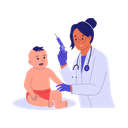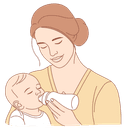4-Month-Old Baby's Development

Written by Mindsmaking Medical Writer
Fact Checked by Mindsmaking Professionals
3rd, October, 2025
At 4 months, your baby is growing fast, developing motor skills, head control, and sensory awareness. There’s so much to know and look forward to in your 4-month-old’s development.
Life with a 4-month-old is full of discoveries and new routines. This stage comes with adorable giggles and playful coos that will keep you both entertained and exhausted. Your baby is not just feeding and sleeping anymore, they are connecting the dots, engaging with the world, and may even start acting like your little companion.
Baby development at 4 months is a lively mix of more interaction, stronger movements, and growing routines. Congratulations! Your baby is changing right before your eyes, and that amazing feeling is just the tip of bigger growth milestones that are coming.
Key Takeaways
Your 4-month-old is no longer just feeding and sleeping they’re discovering, laughing, and connecting with you like a tiny companion.
By 4 months, babies hold their head steady, push up during tummy time, roll unexpectedly, and grab or shake toys each move building strength, coordination, and motor skills.
Those newborn reflexes are fading! Rooting and Moro (startle) reflexes give way to purposeful movements, smiles, and curiosity.
Your baby moves from coos to babbling “ba-ba” and “da-da,” laughs out loud, and locks onto faces and bright colors.
At 4 months, babies anticipate routines, recognize voices, and reach for toys with intention showing growing memory and curiosity.
Your baby now gives social smiles, mimics your expressions, and craves playtime peekaboo may earn you giggles every time.
Feeds are more efficient, 4–6 oz at a time, and sleep stretches longer, totaling 12–16 hours a day. Solids still wait until 6 months.
Strengthen muscles with tummy time, spark language with songs and stories, offer rattles for grasping, and play peekaboo for bonding.
See your doctor if your baby isn’t smiling, responding to voices, holding their head, or moving hands early support matters.
Every baby grows at their own pace celebrate the giggles, rolls, and smiles, and seek guidance if you’re concerned.
Physical and Motor Development
By 4 months, your baby is starting to act like they own their little body. They are now stronger, steadier, and way more curious. It is not just growth; it is mini-acrobatics with a lot of drool. Here is what you can expect and laugh about during your 4-month-old baby's development.
Physical and Motor Development

Head Control
The wobbly bobblehead days are behind you. By now, your baby can hold their head steady without your hand to support them. Whether they are sitting on your lap or being held upright, they’re practicing showing off their strength. This progress is a huge milestone, and a little reminder that both you and your baby’s teamwork is paying off.

Tummy Time
Tummy time is no longer just a struggle session; it is now a show. Your baby can push up on their arms, lift their head high, and scan the room like a tiny security guard on duty. Surprisingly, they may suddenly roll from tummy to back, leaving you cheering. Beyond the cuteness, tummy time is building the muscles they’ll need for sitting, crawling, and walking later. It also helps keep flat spots off the back of their head.

Hand Coordination & Curiosity
At 4 months, your baby’s hands are in full discovery mode. They will grab toys with more control, shake them like maracas, and of course, try to chew them. When no toy is around, fingers become the main attraction. You may catch them clasping their hands together, pulling at clothes, or reaching for objects in sight, even if they do not always succeed. Every attempt builds motor skills and keeps them busy “training” those little hands.
Reflexes
Your 4-month-old baby is now gaining more control of their actions, unlike when they were newborns. Most of their movements are now voluntary reflexes. Remember that at birth, they would startle at loud noises or sudden movement without even planning it. Those were the times of involuntary reflexes. They just act without thinking, just to survive outside the womb. As part of your baby's 4-month-old development, most newborn reflexes will start fading away at this stage. This shows that your baby is going through normal brain development.
If you touch a 1-week-old baby on the cheeks, they will turn their head towards the touch to find food a phenomenon known as rooting. By four months, this rooting reflex should be fading away as more voluntary movements begin to take over. Also, the startle (Moro) reflex starts to disappear at this stage. Your baby may still startle once in a while, but it will not be as much as before.
A major part of a 4-month-old baby's development is that movements are now done with purpose and control rather than being unplanned. Really, your baby is smiling or laughing because they recognize you, not just because it happened. They are reaching for an object because they are genuinely curious about it. So, enjoy the connection and bonding that this stage brings.
Communication and Sensory Development
Remember that earlier in your baby's development stage, they started making vowel-like sounds in the form of “aah,” or “oooh.” Now that they have reached their 4-month-old development milestone, you will see them moving from cooing to babbling. This is the point where your baby begins to combine consonant sounds with the initial vowel sounds they have been making. You may hear simple sounds like “ba,” “pa,” or complex sounds like “ba-ba-ba,” “a-da,” or “da-da.” Even if they do not make sense yet, babbling is an important part of language development for babies. This sound experiment will continue even after their 4-month-old development.
At 4 months, your baby can communicate by crying, mimicking your sounds, and using their facial expression. When you talk, they may begin to mimic your sounds, although there is never a time when they will get it correctly. In fact, they may start to smile when you speak to show that they can hear you. The most interesting milestone for your 4-month-old baby is that they will begin to laugh out loud. What a time to be a parent! Is this not magnificent? If you have not experienced it yet, get ready for the first laughter that will warm your heart and take your worries away.
Your baby is also going through sensory development at this stage. Their vision has become clearer, and they can use it to follow moving objects across the room. They also enjoy watching bright colours, mirrors, and faces.
Read This Next
No posts available
Cognitive Development
Already, your baby's brain is developing in its own little way. When your newborn hears familiar voices like your own, they can recognize them. Not only that, they may respond with cooing, gurgling, or a full laugh just to show they know you. This is to show you love and affection. Your 4-month-old baby can also spot familiar routines and anticipate them. For instance, when you start preparing your baby for breastfeeding or bottle feeding, they may show excitement. The same thing happens if they are aware that play is about to start.
Another cognitive milestone is that your baby will have better hand-eye coordination. So, they can reach for objects more easily, grab them, and play with them as they please. Once in a while, you may also find them reaching out for toys with just one hand.
Your 4-month-old is now very curious about people, events, and surroundings. When they are in your hands, they will watch your face closely as if to ask questions. They also study their surroundings to understand activities. Each of these milestones is important to the overall development of your baby.
Social and Emotional Development
Once your baby reaches the 4-month-old milestone, you can easily call them your social buddy. This is because they are now very active and ready to interact with you. Unlike the previous smiles that come once in a while in their sleep, you will start to see real social smiles directed at you. These smiles are no longer reflexes; they are responses to you or other people.
This is the time your baby seeks attention with coos, babbles, and body movements. Now, your baby is playful with others and may get upset if you decide to stop playing. During playtime, they may try to copy your movements and facial expressions. If you stick your tongue out, they may try to do the same. It is even more fun when you sing, talk to them, or play “peekaboo”. When you hide your face for a while and reveal it later, your baby will be amused. You may even hear them laugh this time.
As you engage in these activities, the bond between you and your baby will strengthen. You will experience a mix of joy, surprise, and laughter. Your baby will feel safe, comforted, and loved. This is why babies may show a preference for caregivers over others.
Feeding and Sleeping
By the time your baby is four months old, feeding and sleeping have begun to settle into a routine. However, do not let your guard down, because surprises are still lurking around every corner. Your baby is no longer just eating and dozing; they are learning, growing, and sometimes even showing you how efficient they can be at mealtime.
At this stage, most babies take about 4–6 ounces per feed, around 5–6 times a day. Whether you are breastfeeding or bottle-feeding, your little one is getting better at finishing their meal and may even pause mid-feed just to look around with curiosity. Sometimes, they might let out a tiny sigh of contentment, and you cannot help but smile at their maturation.
Sleep is becoming a bit more predictable now. Your baby may begin to stretch out longer during the night and take slightly longer naps during the day, resulting in a total of 12–16 hours of sleep in 24 hours. Some night feedings may be dropping, which gives you a bit of time to rest. Solids are not recommended until around 6 months old, or as advised by your doctor. For now, their little tummies are perfectly happy with breast milk or formula. Also, every feed and nap contributes to their growth and development.
Important Milestones to Note

Doctor’s Check-Up
At 4 months, your pediatrician will measure your baby’s weight, length, and head circumference, then compare it to their growth chart. They’ll also observe motor skills, such as head control and early rolling, to ensure development is on track.

Immunizations
Your baby may receive their second or third round of vaccines at this visit, including DTaP, Hib, IPV, PCV, and rotavirus. The shots may bring a few tears, but they’re essential for protecting your baby’s health.

Feeding Guidance
The doctor may discuss signs of readiness for solid foods, although most babies typically start around 6 months. For now, breast milk or formula continues to provide all the nutrition your baby needs.

Parent Preparation
Use this visit to ask questions about feeding, sleep routines, or new baby skills, such as grasping and rolling. These appointments provide an opportunity for you to support your baby’s overall growth and development.
How to Support Your Baby's Development
Your 4-month-old is bursting with curiosity and energy, and honestly, they keep you just as busy as they keep themselves. Supporting their growth at this time does not mean buying fancy gadgets; it is about simple, everyday moments that make a big difference. Here is how you can help your little one develop:
- Practice a few minutes of tummy time daily to strengthen neck, shoulder, and core muscles.
- Talk, sing, and read aloud to build listening and early language skills.
- Offer rattles or easy-to-grasp toys to improve fine motor skills.
- Play peekaboo to encourage social bonding and laughter.
- Use mirrors or colorful objects to stimulate vision and curiosity.
When to See a Doctor
Your 4-month-old is growing fast, learning new baby skills, and filling your days with joy and surprises. However, their health and safety are just as important, and knowing when to see a doctor can help you ensure they are on the right track.
If your baby is not smiling or showing interest in people at this stage, it is advisable to seek medical attention. Also, see a doctor if they are not responding to sounds or voices. By 4 months, most babies respond to smiles, laughter, and familiar voices, and these interactions are crucial milestones in their social and sensory development.
Other signs to watch for include trouble holding their head steady, not bringing their hands to their mouth, or showing unusual stiffness, weakness, or lack of movement. If you notice any of these, do not wait to contact your doctor. Early guidance and intervention can make a big difference in helping your baby develop as they should.
A Word from Mindsmaking
Just the way fingers are not equal, every baby grows at their own pace. If your baby has not achieved some of these growth milestones, it does not mean they will not get there eventually. Talk to your doctor if you have any concerns, to get help that is certain.
Your 4-month-old baby's development is yet another remarkable milestone for you and your baby. Celebrate the giggles, first rolls, laughter, and your growing connection.
Above all, ensure you enjoy every bit of these playful, smile-filled moments with your baby because you earned it.
Was this article helpful?
How many stars are you giving this article?
Leave a comment
Your email address will not be published.